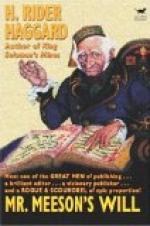“My dear, do let me see,” said Lady Holmhurst, as soon as the servant had left the room.
With a sigh Augusta uncovered her shoulders, and her friend ran round the table to look at them. There, on her neck, was the will. The cuttle ink had proved an excellent medium, and the tattooing was as fresh as the day on which it had been done, and would, no doubt, remain so till the last hour of her life.
“Well,” said Lady Holmhurst, “I hope the young man will be duly grateful. I should have to be very much in love,” and she looked meaningly at Augusta, “before I would spoil myself in that fashion for any man.”
Augusta blushed at the insinuation, and said nothing. At ten o’clock, just as they were half through breakfast, there came a ring at the bell.
“Here he is,” said Lady Holmhurst, clapping her hands. “Well, if this isn’t the very funniest thing that I ever heard of! I told Jones to show him in here.”
Hardly were the words out of her mouth when the butler, who looked as solemn as a mute in his deep mourning, opened the door and announced “Mr. Eustace Meeson,” in those deep and commanding tones which flunkeys, and flunkeys alone, have at their command. There was a moment’s pause. Augusta half rose from her chair, and then sat down again; and, noticing her embarrassment, Lady Holmhurst smiled maliciously. Then came in Eustace himself, looking rather handsome, exceedingly nervous, and beautifully got up—in a frock-coat, with a flower in it.
“Oh! how do you do?” he said to Augusta, holding out his hand, which she took rather coldly.
“How do you do, Mr. Meeson,” she answered. “Let me introduce you to Lady Holmhurst. Mr. Meeson, Lady Holmhurst.” Eustace bowed, and put his hat down on the butter-dish, for he was very much overcome.
“I hope that I have not come too early,” he said in great confusion, as he perceived his mistake. “I thought that you would have done breakfast.”
“Oh, not at all Mr. Meeson,” said Lady Holmhurst. “Won’t you have a cup of tea? Augusta, give Mr. Meeson a cup of tea.”
He took the tea, which he did not want in the least, and then there came an awkward silence. Nobody seemed to know how to begin the conversation.
“How did you find the house, Mr. Meeson?” said Lady Holmhurst, at last. “Miss Smithers gave you no address, and there are two Lady Holmhursts—my mother-in-law and myself.”
“Oh, I looked it out, and then I walked here last night and saw you both sitting at the window.”
“Indeed!” said Lady Holmhurst. “And why did you not come in? You might have helped to protect Miss Smithers from the reporters.”
“I don’t know,” he answered confusedly. “I did not like to; and, besides, a policeman thought I was a suspicious character and told me to move on.”
“Dear me, Mr. Meeson; you must have been having a good look at us.”
Here Augusta interposed, fearing least her admirer—for with an unerring instinct, she now guessed how matters stood—should say something foolish. A young man who is capable of standing to stare at a house in Hanover-square is, she thought, evidently capable of anything.




